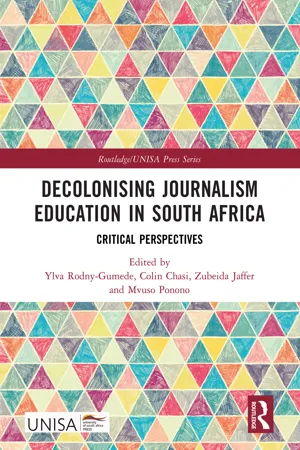
eBook - ePub
Decolonising Journalism Education in South Africa
Critical Perspectives
This is a test
- 272 pages
- English
- ePUB (mobile friendly)
- Available on iOS & Android
eBook - ePub
Decolonising Journalism Education in South Africa
Critical Perspectives
Book details
Table of contents
Citations
About This Book
This book is the culmination of several years of collaborative work. It is a unique contribution to the field of journalism because of the depth and variety of contributions it makes to the field.
The scholars who contribute to this volume respond to the great need to rethink journalism from various perspectives including journalism training, research, the contents of the news media, language, media ethics, the safety of journalists and gender inequities in the news media. In doing this, they recognise how the societies that journalism address should themselves change.
Frequently asked questions
At the moment all of our mobile-responsive ePub books are available to download via the app. Most of our PDFs are also available to download and we're working on making the final remaining ones downloadable now. Learn more here.
Both plans give you full access to the library and all of Perlego’s features. The only differences are the price and subscription period: With the annual plan you’ll save around 30% compared to 12 months on the monthly plan.
We are an online textbook subscription service, where you can get access to an entire online library for less than the price of a single book per month. With over 1 million books across 1000+ topics, we’ve got you covered! Learn more here.
Look out for the read-aloud symbol on your next book to see if you can listen to it. The read-aloud tool reads text aloud for you, highlighting the text as it is being read. You can pause it, speed it up and slow it down. Learn more here.
Yes, you can access Decolonising Journalism Education in South Africa by Ylva Rodny-Gumede, Colin Chasi, Zubeida Jaffer, Mvuso Ponono, Ylva Rodny-Gumede, Colin Chasi, Zubeida Jaffer, Mvuso Ponono in PDF and/or ePUB format, as well as other popular books in Languages & Linguistics & Journalism. We have over one million books available in our catalogue for you to explore.
Information
Table of contents
- Cover Page
- Half Title page
- Title Page
- Copyright Page
- Contents
- Preface
- Contributors
- Chapter 1 Introduction
- Chapter 2 On the Meaning of Decolonisation
- Chapter 3 The Decolonial Problematic in Journalism Ethics
- Chapter 4 Making a Case for Decolonising Journalism and Media Studies
- Chapter 5 Birthed by the West: Complexities of Redefining Journalism Curricula in South African Universities
- Chapter 6 Towards a Research Agenda for African Media and Communication Studies: Pathfinders Must First Know Where They Are
- Chapter 7 Journalism and Media Studies Education in South Africa
- Chapter 8 Power, Knowledge and Journalism: The Naspers-127 Submission to the Truth and Reconciliation Commission and Its Aftermath
- Chapter 9 A Very Long Erratum Note: The Corrective Role of the South African Media as a Form of Transitional Justice
- Chapter 10 A Decolonial Analysis of the Cyberbullying of South African Women Journalists
- Chapter 11 Not Clowns but Capable Agents: Tapping into Subaltern Theory to Centralise the Marginalised
- Chapter 12 In-Between Journalism and Media Development: Negotiating Journalist Safety within Decolonising African Contexts
- Chapter 13 Decolonising Media Ethics and Media Accountability Systems: Elevating the Value of Voice in Southern Journalism
- Chapter 14 “Because Of This Khephu”: Dehumanisation Through Language in ‘South African’ Media
- Chapter 15 Living Under Coloniality from Social Experiment to Common Experience: Lessons from Nat Nakasa
- Chapter 16 The Oral Archive as ‘First Author’ in the Emergence of the 19th Century African Newspaper Intellectual Tradition
- Chapter 17 Developing a New National Narrative for South Africa: A Decolonial Approach
- Index